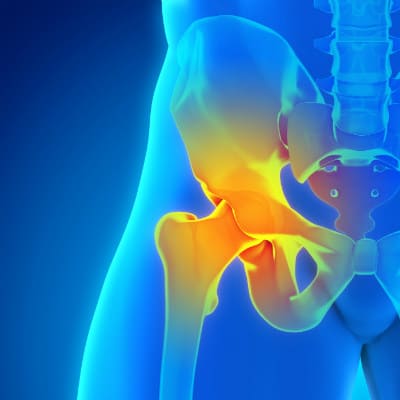Hip Surgeon Sydney
In the past patients were very concerned about joint replacements wearing out. In fact this is not such an issue with a recent study indicating that hip replacements may last over 30 years. The failure rate is only 1% per year meaning that in 10 years 90% of implants are OK, in 20 years 80% of implants are OK and in 30 years 70% of implants are OK.
Hip replacements get you back to doing what you love – whether that is reading, concerts, movies, bowls, golf or even ballroom dancing!
By replacing the hip joint with durable implants, you can finally be able to have a fully functional pain free joint allowing you to resume normal life activities. Orthopedic Surgeon Sydney A/Prof Nigel Hope will assess your personal situation and determine if this is the right course of action for you.


What is hip arthritis?
Hip Arthritis, (formally named Osteoarthritis and also known as Degenerative Joint Disease) is the most common form of arthritis that may also affect other joints including knees, hands, shoulders, and the spine.
Damage to the joint surface causes pain, swelling, stiffness, restricted movement and greatly reduces your quality of life.
How is the hip joint structured?
What are the causes of hip injuries?
Many large muscles are required to move the hip joint through its large range of motion. Once the hip joint becomes worn or arthritic the muscles have to contract much more strongly during normal activities and this often causes trauma due to muscle strain and tearing. Overstretching and overuse also result in a muscle strain injury. Strains often occur in the hip region from sudden muscle contractions and are graded as mild, moderate or severe.
When should I have hip surgery?
The decision to have hip surgery can be a psychologically daunting one. As with any surgical procedure there is always an element of anxiety and fear to overcome. Rest assured that your Sydney orthopaedic surgeon A/Prof Nigel Hope will guide and support you through this tough time.
Depending on the severity of symptoms you may be experiencing the decision to proceed with the surgery may be more easily made if you consider whether or not you are having –
- Inadequate or no response to medications and/or non-surgical treatments
- Radiating pain in the groin, lower back, and thighs
- Pain when shifting weight on to the affected hip
- Stiffness in the hip while walking
- Pain experienced in front of the thigh, the knee and buttocks
- A massive reduction in your quality of life and decreased mobility affecting your everyday activities.
If you are experiencing any of the above symptoms and feel that you do require surgery to improve your quality of life then the next step in achieving relief will be to book an appointment where some or all of the following tests will be arranged to properly diagnose your issue:
Imaging tests: such as X-ray, CT Scan and MRI Scan may be required to assess the possible extent of damage to the bone, cartilage, and surrounding tissues.
How is a hip replacement surgery performed?
Orthopaedic Surgeon A/Prof Nigel Hope specialises in the direct anterior approach (DAA) for hip replacement. DAA enables the surgeon to enter the hip joint from the front of the thigh and travel between muscles. Once the hip joint has been replaced the retractors are removed from the area and the muscles fall back into position. This approach optimises rehabilitation and recovery.
The typical hip replacement procedure is achieved firstly by the removal of any diseased bone, worn-out cartilage, including the defective ball joint and socket.
Then the hip joint is replaced with hard-wearing state of the art materials including durable biologically inert metal which is press-fitted into the strong healthy bone.
Pre-Operative Guidelines
- Consult your orthopaedic surgeon for anti-inflammatory medications
- Consult your orthopaedic surgeon regarding Naturopathic and herbal medications
- You must stop smoking prior to your surgery (the longer you stop the better)
- Prior to having any other operations or procedures you should consult a doctor.
- You will be asked to undertake a general medical check-up with a physician.
- Your orthopaedic surgeon A/Prof Nigel Hope will send you for routine blood tests and any other investigations required prior to your surgery
- Prepare your home for your recovery period after surgery.
After the surgery
When you wake up after the surgery is completed you will be in the recovery room attached to health monitors that measure your blood oxygen saturation, pulse rate, blood pressure, body temperature. In addition to the health monitors, you will have a hip dressing over the wound.
Patients stay in the hospital for 5-7 days and are then discharged to go either home or to a rehabilitation hospital depending on the degree of recovery. Your physiotherapist will help you with your post-op hip exercises.
For about 2-3 weeks after the surgery, you will be required to walk with crutches and then will need to use walking aids for another 4-6 weeks.
Please be careful, this is a newly installed artificial hip, you will need time to rest and recover.
Your Orthopaedic Surgeon A/Prof Nigel Hope will provide you with the relevant post-operative exercises for your procedure.
Postoperative hip replacement safety recommendations include –
- Avoid crossing your legs and bending your hip past a right angle.
- Avoid bending over to pick things up. Ask someone else to help or use a grabber.
- Avoid laced boots, formal shoes, runners, sneakers (slip-on shoes or thongs are advised)
- Avoid low chairs and stools – an elevated toilet seat is helpful
- You will need to sleep with a pillow between your legs for 6 weeks
- Once the wound has healed you can resume showering and application of Vitamin E or Moisturizing Cream is advised.
- If your temperature, redness or swelling you should call your local emergency department.
- If you need to get any dental work or any other surgery, you will need to take antibiotics before and after to prevent infection in your new prosthesis.
Consult your orthopaedic surgeon A/Prof Nigel Hope for details.
Please note that your hip replacement may go off in a metal detector at the airport.

